Dublin is Dead, Long Live Dublin!
Adelina Marini, October 15, 2015
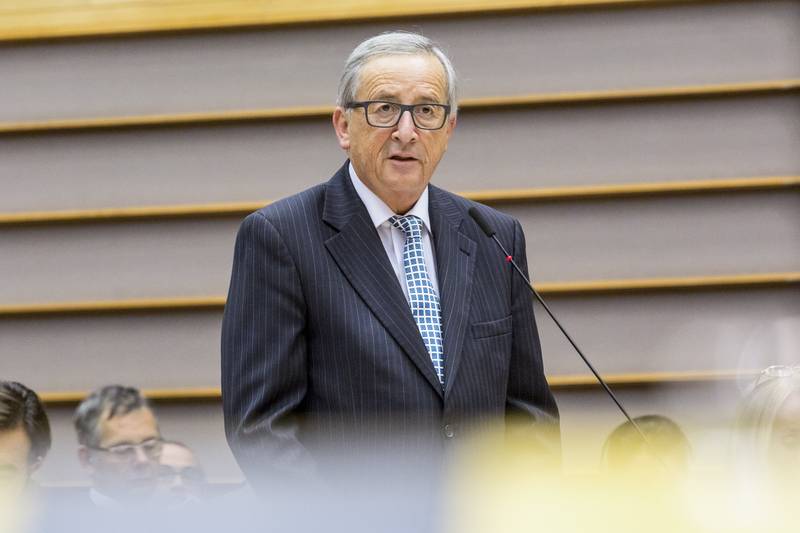 You will probably not be surprised that today starts the fourth in a row summit dedicated to the migrant-refugee problem. It is only just now, however, that someone shouted “The king is naked!”. The subject is accompanied by a lot of tension, discussions, arguments, wall-building, trade wars even. There was no lack of insulting words exchanges too, to finally reach a deal, which is totally inadequate to the rapidly changing situation. Since the beginning of the autumn political season, hundreds of pages with decisions were written, amendments to European legislation and the European budget, warnings for breaking the rules, protest notes, invitations, and negotiation positions, all with the same result – the European Union is helpless, divided, and inadequate.
You will probably not be surprised that today starts the fourth in a row summit dedicated to the migrant-refugee problem. It is only just now, however, that someone shouted “The king is naked!”. The subject is accompanied by a lot of tension, discussions, arguments, wall-building, trade wars even. There was no lack of insulting words exchanges too, to finally reach a deal, which is totally inadequate to the rapidly changing situation. Since the beginning of the autumn political season, hundreds of pages with decisions were written, amendments to European legislation and the European budget, warnings for breaking the rules, protest notes, invitations, and negotiation positions, all with the same result – the European Union is helpless, divided, and inadequate.
The regular autumn October Council will not be an exception but will, however, be a little different, judging by the moods on its eve. The declaration is for “let’s say it all out in the open”. A high-ranking EU source admitted that up to now diplomats had been preparing common and general questions for the summits, but this time President Donald Tusk has decided that issues must be addressed point blank. The subject of migration and the refugees will be the main topic on the summit’s agenda, which Donald Tusk wishes to fit into a single day instead of the usual two. The hope of his team is that the 28 leaders will manage to reach an agreement on the contents of the summit conclusions.
A high-placed EU source announced on Wednesday that there was still hard work being done on drafts of the conclusions, as too many items remained unclear. The trouble is that these items are fundamental and by no means new, but they are still the subject of philosophical debates. For example, there is still no agreement between member states on what is a hotspot. You will recall that around the time of the emergency informal summit only three weeks ago (September 23rd) the meaning of this term, introduced by the EC in May in the migration programme, caused a lost in translation episode, as this website reported.
According to the source, the dilemma regarding the hotspots is whether they are a process or a place. “Don’t have too high expectations [on this subject]. We are not expecting to reach a consensus”, said the source. The lack of clarity on what exactly is a hotspot did not prevent having it written in the draft conclusions that member states will continue with the creation of more hotspots in the agreed timeframes. This will be one of the most-discussed subjects, according to the invitation letter of European Council President Donald Tusk. It is, however, second on the menu of the summit. The first subject will be the future of the Dublin system. The same source announced that the time is right for the leaders to agree whether Dublin is dead or not. This becomes quite necessary after the hearing of German Chancellor Angela Merkel and French president François Hollande by the European Parliament last week, when she stated that Dublin had gotten outdated. “We have to be frank the Dublin procedure in its current form is obsolete. It was well thought back then but it has not proved itself viable in the current situation at our borders,” stated Ms Merkel in the packed plenary hall in Strasbourg.
Her statement supports her actions so far. Berlin announced in the summer that it is stopping to enforce the Dublin regulation in order to demonstrate solidarity with states most affected by the refugee and migrant crisis (Greece and Italy) and refused to send back refugees that came from these two states. This provoked a sharp reaction in the rest of the member states, which accused Angela Merkel that with these actions she practically invited refugees and migrants to continue coming into Europe. Initially the EC welcomed Germany’s decision and qualified it as a symbol of solidarity, but several weeks later Commissioner for Migration Dimitris Avramopoulos (Greece, EPP) scolded Berlin for not following European legislation and urged that it is adhered to. In his letter to the leaders Donald Tusk urges member states to decide whether Dublin should remain, for if it is officially pronounced dead, alternatives need to be looked for.
According to the high-ranking source, the lack of alternative to the Dublin regulation is extremely dangerous. The third item that Mr Tusk proposes to be discussed tonight in Brussels is common border protection. Another conflict issue. In the draft conclusions that are available to euinside it says that leaders commit to work on the gradual construction of an integrated system for management of the outside borders. It also says that the current mandate of the border agency Frontex should be used to the maximum, which contradicts the European Commission’s programme, which insists on expanding the agency’s mandate. The Commission announced that by the end of the year there will be a concrete 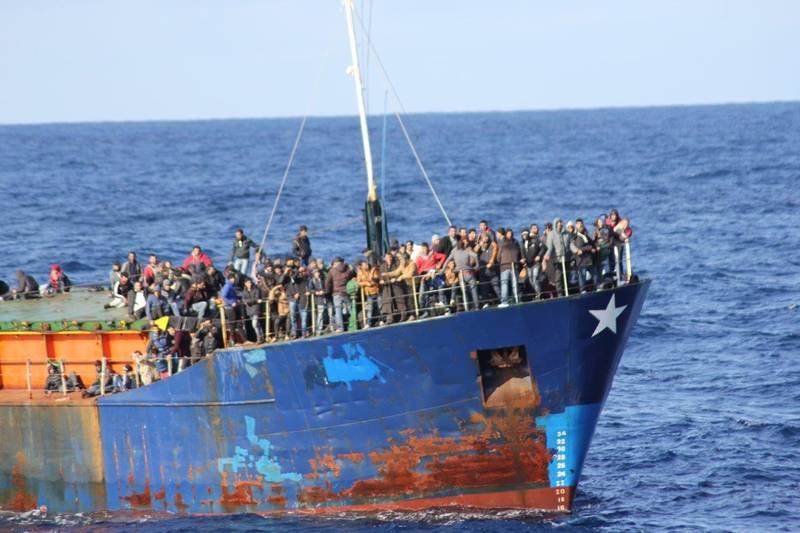 proposal on the subject. The EU source thinks there is potential for an approval of joint border protection in the most-affected states.
proposal on the subject. The EU source thinks there is potential for an approval of joint border protection in the most-affected states.
His hopes are backed by the fact that the ministers of internal affairs of the EU discussed the issue last week and according to the conclusions from their meeting, there was a significant majority of states, which are for boosting collective responsibility for the protection of outside borders and for the need for strengthening the role and capacity of Frontex. It is true, that this statement does not yet mean widening of the mandate of the border agency, but it is in this direction. In this sense it is bewildering that the idea is totally rejected in the draft conclusions.
Member states in Mirrorland
The draft conclusions look like they are coming from a parallel reality. It says in them that implementation of measures agreed on in the previous summit is rapidly advancing, “as is evident from the work within the Council and from the report of the Commission of October 14th”. The report of the EC, however, says something entirely different, and it is that member states are not fulfilling their commitments. Unlike the Council, the EC has no dilemmas about the meaning of a hotspot. The document, presented by the Commission on Wednesday noon, gives the definition: “A 'hotspot' is a section of the EU external border or a region with extraordinary migratory pressure which calls for reinforced and concerted support by EU Agencies”. Meaning, this is a place. Frontex has requested 775 additional border policemen, screeners, debriefers, and translators. 670 of them are to be distributed to hotspots in Italy and Greece and the rest – elsewhere in the EU. The European border agency thinks this number will be enough to cover requirements by the end of January 2016.
The European Asylum Support Office (EASO) has asked for over 370 experts for Italy and Greece, who are to cover requirements by the third quarter of 2017. The role of experts is to support local authorities in the process of registration of asylum seekers, providing information, connected to relocation, and detection of falsified papers. By October 8th, however, only six member states have responded to EASO’s request with 81 experts out of the needed 374. Also six countries have responded to the appeal of Frontex with 48 border policemen. There are currently six hotspots in Italy. Those are Augusta, Lampedusa, Porte Empedocle, Pozzallo, Taranto, and Trapani. The first joint team is fully operational and works in Lampedusa. Greece has identified five hotspots – Lesvos, Chios, Leros, Samos, and Kos.
The first relocations were conducted this month after the agreement reached in the Council of Ministers of Justice and Home Affairs on September 22nd, which was named historical by Commissioner Avramopoulos. On October 9th a flight left Rome en route to Sweden, carrying 19 citizens of Eritrea aboard. According to the EC, this first step was extremely important in building trust in the system, for so far the refugees had no trust in it and refused to be registered. Now they are queueing for registration. Member states committed to establishing national contact spots for the distribution of refugees, but so far only 21 member states have done so – Austria, Belgium, Bulgaria, Croatia, Cyprus, Finland, France, Germany, Greece, Hungary, Italy, Latvia, Luxembourg, Malta, Poland, Portugal, Romania, Slovakia, Slovenia, Spain, and Sweden. It was expected of the member states to send liaison officers to Italy and Greece, but this has been done by 22 members.
Member states are failing in other commitments, agreed on after prolonged meetings, as well. The EU has a special mechanism for civil protection, which is activated in case a country feels it cannot deal with a certain crisis. Up until now aid from this mechanism was requested by Hungary and Serbia. The mechanism relies on voluntary participation by member states in the form of equipment, expertise, shelter, and medical supplies. Last month the EC asked member states to send data on their potential for participation, but only eight responded – Belgium, Cyprus, Finland, Sweden, Slovakia, Czech Republic, Lithuania, and Latvia.
On September 23rd, member states agreed to release extra funds to the different European and international agencies, which are working outside the borders of the EU on sheltering the refugees, providing food, medical supplies, and education. Since then, only ten member states have committed to additional payments totalling 275 million euro. These are Cyprus, Czech Republic, Finland, Germany, Italy, Latvia, Luxembourg, Poland, Spain, and Great Britain. Actually, though, Great Britain and Germany have pledged to give 80% of the amount. The shortage is 225 million euro. The Commission released an additional 500 million euro to the EU regional trust fund and requested that member states match this contribution. Although Syria is at the core of the current crisis, the EC points out, only two states have committed funds. Italy with 3 million and Germany with 5, leaving a shortage of 492 million euro.
Same situation with the emergency trust fund for Africa. The Commission increased to 1.8 billion euro the contribution from the European budget and asked that member states match it. Only three have promised 3 million euro each – Luxembourg, Germany, and Spain. Six have confirmed participation, but have not mentioned exact amounts – Belgium, Denmark, France, Italy, Malta, and the United Kingdom, and four said it is highly likely they will join – Austria, Netherlands, Finland, and Sweden, while Czech Republic, Estonia, Latvia, and Greece are still deliberating their involvement.
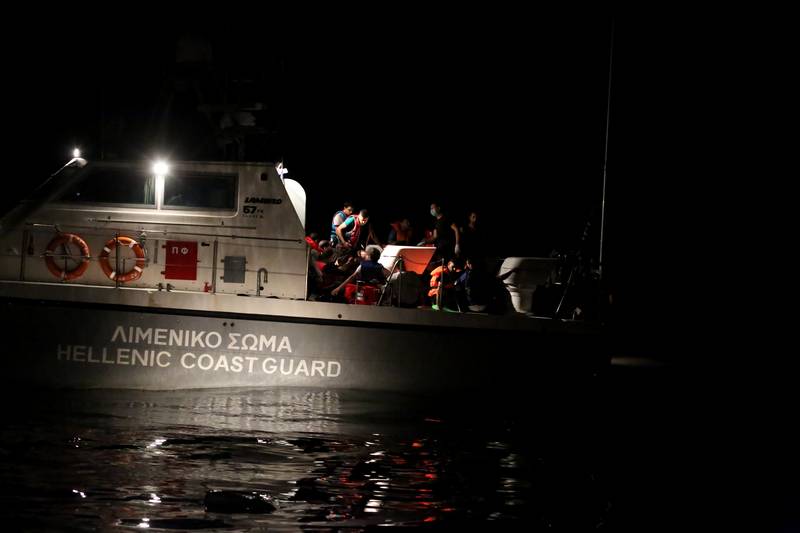 An EU source stated that many member states are planning to announce their contributions during the summit on migration in Malta, where leaders of the EU and leaders from Africa will gather together. According to Donald Tusk, however, contributions must be made before the meeting in Valletta, for this would create a better atmosphere for the summit and will strengthen Europe’s position. In the draft conclusions, leaders are promising to fulfil the requests of Frontex and EASO and continue with the implementation of all agreed on. The European Parliament criticised the member states on Wednesday for their inactivity during a hearing of the bosses of the EC and the European Council over the coming summit. “It's not enough to promise, it’s deeds that count!”, said Jean-Claude Juncker. Member states were criticised by almost all political groups for failing to fulfil their financial commitments of September 23rd.
An EU source stated that many member states are planning to announce their contributions during the summit on migration in Malta, where leaders of the EU and leaders from Africa will gather together. According to Donald Tusk, however, contributions must be made before the meeting in Valletta, for this would create a better atmosphere for the summit and will strengthen Europe’s position. In the draft conclusions, leaders are promising to fulfil the requests of Frontex and EASO and continue with the implementation of all agreed on. The European Parliament criticised the member states on Wednesday for their inactivity during a hearing of the bosses of the EC and the European Council over the coming summit. “It's not enough to promise, it’s deeds that count!”, said Jean-Claude Juncker. Member states were criticised by almost all political groups for failing to fulfil their financial commitments of September 23rd.
The real problem is national egotism, agree the MEPs. “These draft conclusions do not remotely constitute an answer to the current situation. These conclusions are the conclusions for never-neverland. Not for the real world of today”, wrapped up Liberal MEP Sophie in 't Veld (Netherlands). The EC threatened in turn that it will continue with the infringement procedures in an attempt to force member states to stop wasting time and energy in promises they then do not keep.
Translated by Stanimir Stoev
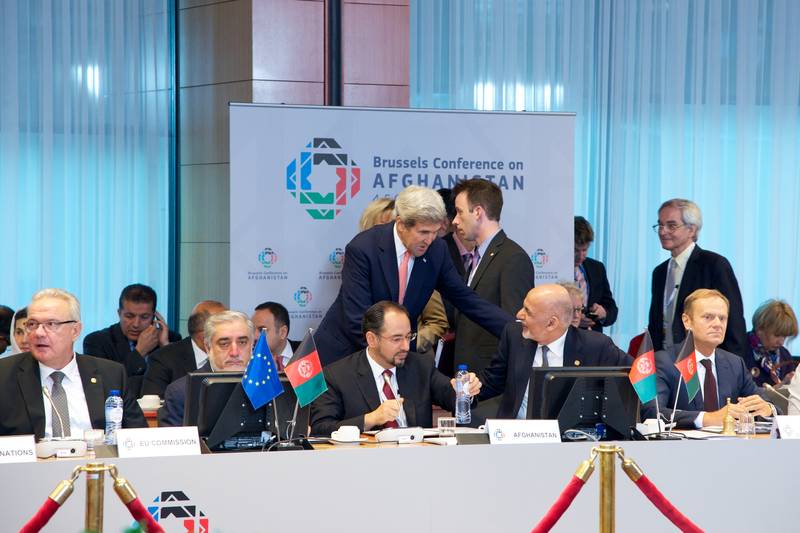 | © Council of the EU
| © Council of the EU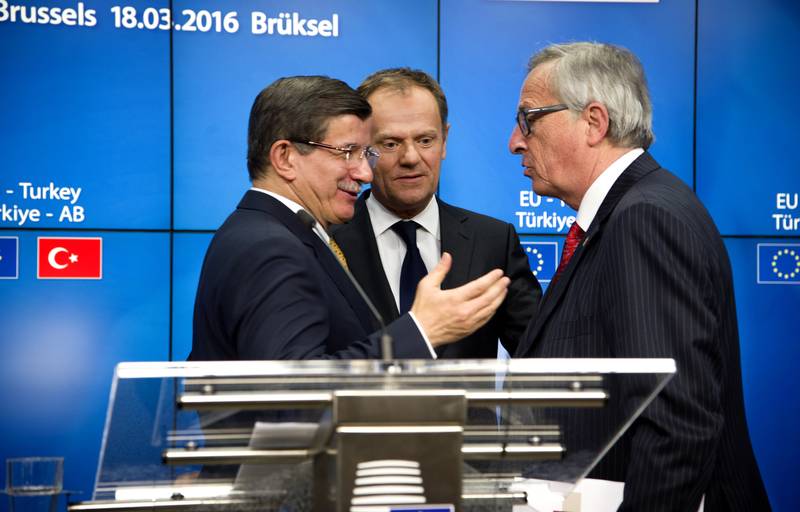 Davutoglu, Tusk, Juncker | © Council of the EU
Davutoglu, Tusk, Juncker | © Council of the EU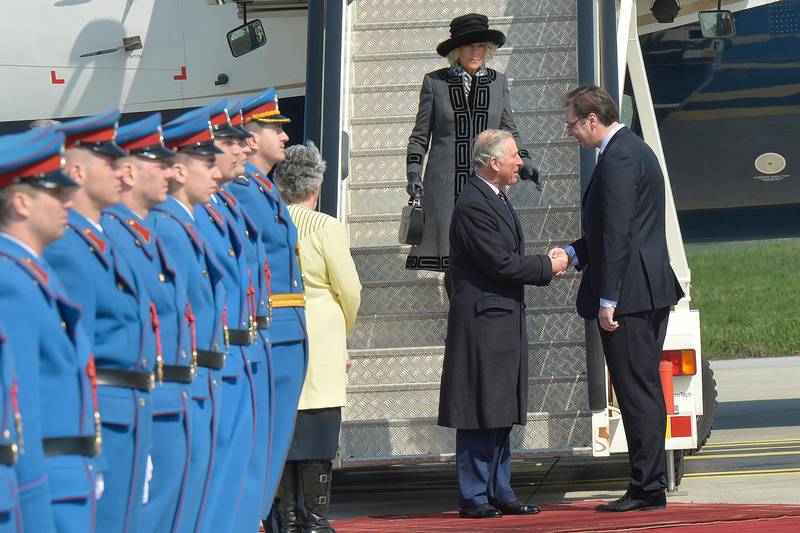 | © Vlada RS
| © Vlada RS